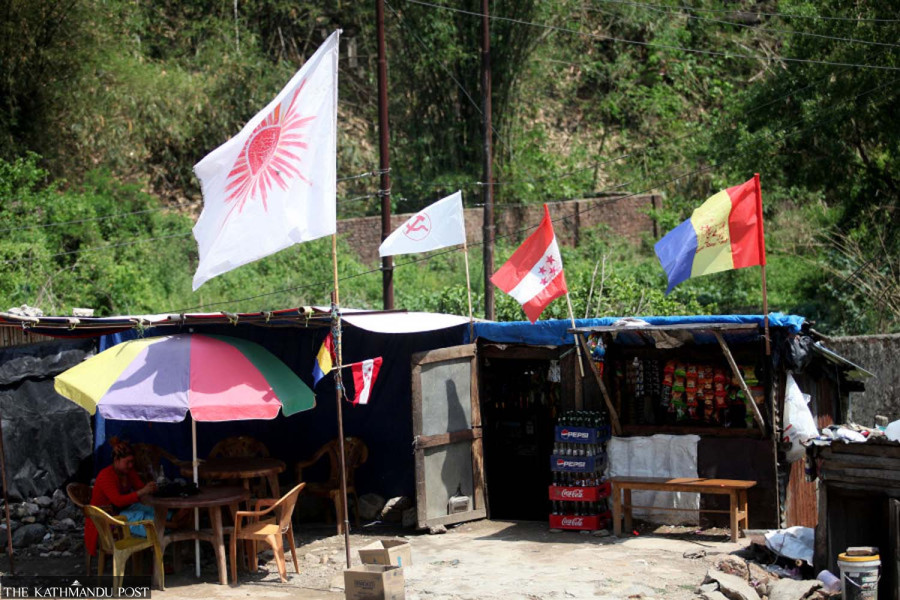Politics
Voter frustration with major parties growing
Some observers equate the current state of public dissatisfaction to that which existed before the April 2006 movement.
Tika R Pradhan & Purushottam Poudel
Shobha Kayastha of Ranibari, Kathmandu, a resident of Kathmandu constituency-5, has decided not to vote in the elections next week.
Kayastha, along with her spouse, voiced her frustration with the leaders for their repeated failures to deliver on development promises and their “utter shamelessness”.
Rising public frustration due to non-performance and failure of politicians is dangerous for democracy, observers worry.
“Barring some party cadres, everyone we talk to is frustrated with the performance of our politicians and their lack of accountability,” said Kayastha, who runs a readymade clothes shop. “Can you give one reason why anyone should stay in this country?”
The Kayastha couple is fed up also because the road in front of their shop was dug up three times in the last two years, leaving the area muddy throughout the rainy season and dusty at other times.
“The leaders don’t know how much the delay in road-repair has cost local businesses,” she said.
Of late, public disenchantment has grown after several senior leaders picked their near and dear ones as candidates for parliamentary and provincial assembly elections under both the proportional representation and first-past-the-post systems.
Voters’ changing mood was visible in the mayoral election in May. People in Kathmandu Metropolitan City, Dharan Municipality and Dhangadhi Sub-metropolitan City elected independent candidates as mayors.
Recent projections by a few news websites have shown that independent candidates, especially those from the Rabi Lamichhane-led Rastriya Swatantra Party, could this time snatch some parliamentary and provincial seats from the big parties.
Anisha Acharya, a permanent resident of Biratnagar who is a master’s level student, expects new faces in the political scene after the elections.
“There is unhealthy competition among members of the same political parties, and they have been playing with public emotions,” Acharya said. However, there is some optimism this time as many educated youths are contesting the elections either independently or as candidates of new parties.”
Many people have pinned their hopes on independent candidates this time, but these candidates, if they win, will struggle to deliver as they lack political organisation, observers say. Political analyst Rajesh Gautam says: “Though new faces are welcome in politics, most of them have no prior experience of holding public office, and they are not accountable to anyone even if they fail to deliver.”
Krishna Khanal, a professor of political science, is disturbed by growing public disenchantment with political parties. This could lead to a situation seen prior to the second people's movement of 2006, he said. “The revolution culminated in the overthrow of the monarchy, which had been discredited under King Gyanendra.”
In that time, the movement launched by seven political parties was unable to gain traction as public opinion was largely unfavourable towards them.
Khanal recalled that the people’s movement led by the political parties gained momentum only after civil society leaders joined the fray.
“Rather than learning from past mistakes, political parties kept belittling people’s agenda. The public objected to the numerous wrongdoings of the KP Oli government, which was formed after the first federal election in 2017,” Khanal told the Post. “But the coalition government formed after the dissolution of the Oli government, led by Nepali Congress President Sher Bahadur Deuba, continues to replicate Oli's faults, which is the reason for people's dissatisfaction with established parties.”
Khanal continues, "If people's rising dissatisfaction with the established political authority is reflected in the elections, party politics can face a debacle."
Dr Govinda KC, a medical reforms campaigner and social activist, on Tuesday appealed to the public not to vote for top leaders of major parties including Congress President and Prime Minister Sher Bahadur Deuba, UML chair KP Sharma Oli and Maoist Centre chair Pushpa Kamal Dahal. Organising a press meet in Kathmandu, Dr KC claimed that the leaders have corrupted and criminalised politics.
Devendra Raj Pandey, a civil society leader and former minister who now uses social media to raise public concerns, agreed with Khanal. "Public dissatisfaction with political parties in the election season should be taken seriously, because there was a similar level of resentment against the parties before the April 2006 popular movement as well.”
Mahendra Gautam, 41, lecturer at Padma Kanya Campus and a permanent resident of Kathmandu-4, says the public disdain for political parties and their candidates is justified because they have ignored common man’s problems and used public offices to enrich themselves and their family members.




 18.12°C Kathmandu
18.12°C Kathmandu
















